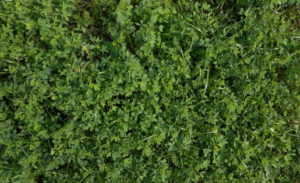Alfalfa-Grass Forage Trials Improve Choices for Farmers & Cows

A combination of reduced-lignin alfalfa planted with the right meadow fescue can result in a large increase in forage digestibility.
Debbie J.R. Cherney / Cornell University
The addition of alfalfa to dairy forage can support healthy milk production. However, because alfalfa relies on temperature to grow rather than day length like grass, it can be challenging to know what varieties to plant in our region that will translate into the perfect mix of forage for New York dairy cows.
The Northern New York Agricultural Development Program (NNYADP), a small grants program that focuses of research areas of interest for farmers in northern New York, has just released their findings on growing alfalfa in combination with grass species to provide dairy farmers the opportunity to enhance forage yield, quality, and digestibility.
The results of the alfalfa-grass mix trials conducted by Cornell University researchers show that a combination of reduced-lignin alfalfa planted with the right meadow fescue can result in a large increase in forage digestibility. The study ranked alfalfa grass varieties and mixes on their fiber digestibility, crude protein, and lignin (a fiber present within alfalfa plants).
Increased forage desirability encourages adequate dry matter intake for cows, in turn supporting healthy milk production. However, knowing the varieties and mixes that will grow properly in your region can be challenging.
“These regionalized trials are especially important for analyzing the localized conditions that impact grass yield and quality,” project leader Debbie J.R. Cherney, a Cornell University professor of Animal Science.
Field trials were conducted in Jefferson and Lewis counties, and are set to continue into 2019 with the future goal of assessing the impact of seeding rates for fescue and reduced lignin alfalfa.
Read more about the research and findings on the NNYADP website.

